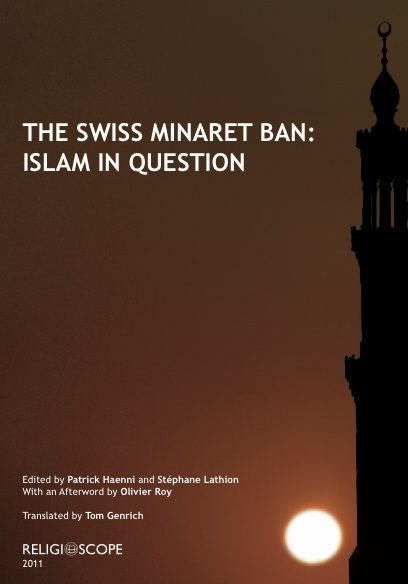Download the book for free!
Please, click here – PDF, 100 pages, 1.3 Mo
Now also available in Urdu!
Please, click here for more details
On 29 November 2009 Swiss voters approved the proposal to introduce a ban on building minarets on Swiss territory into the Federal Constitution. The result surprised large parts of the media and political class.
The most frequently mentioned motive of supporters of the initiative was the wish to give a clear signal against the expansion of Islam and the type of society associated with this religion. The vote’s real objective was not the minaret as such. Rather, the minaret was being turned into a symbol of the issues raised by Islam.
Read The Swiss Minaret Ban: Islam in Question
Edited by Patrick Haenni and Stéphane Lathion
With an Afterword by Olivier Roy
Contents
Foreword
Switzerland without Minarets
Jean-François Mayer
In the Shadow of the Minaret: Origins and Implications of a Citizens’ Initiative
Jean-François Mayer
Citizens’ Initiatives in Switzerland
Stéphane Lathion
The Minaret in the History of Islam
Rachid Benzine
Islam in Switzerland: Figures
GRIS and Religioscope Institute
Cultural Challenge: Islamic Architecture Crosses into the West
Stéphane Lathion
Oskar Freysinger: Let’s Not Be the Victims of Multiculturalism
Patrick Haenni and Stéphane Lathion
The Conquest of the West Will Not Take Place
Patrick Haenni and Samir Amghar
Antonio Hodgers: Fundamentalist Criticism of Islam is also Dangerous
Stéphane Lathion
A Minaret Ban in the Federal Constitution?
Erwin Tanner
Daniel Zingg: Defending Switzerland’s Christian Roots
Jean-François Mayer
Building Churches in Islamic Lands Today
Laure Guirguis
Ender Demirtas: the Initiative is Just the Beginning of a Slippery Slope
Patrick Haenni and Stéphane Lathion
From Minarets to the “Muslim Question”: the New Critique of Islam
Olivier Moos
The Minarets: No Muslim Rage
Husam Tammam
From the Top of the Minaret: Symbols and Social Obliviousness
Olivier Moos and Patrick Haenni
Afterword
Islam in Europe: an Ordinary Religion Like Any Other
Olivier Roy
